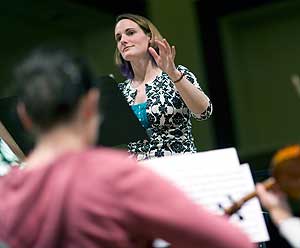Katie Ammann has packed two majors, a minor, two life-changing international experiences, conversations with the homeless and a truckload of musical performances into her four years at Washington University. And her most important lesson: Be open to the possibilities, she says.

“I think probably the most important thing I learned was just being able to plug into my own creativity and being able to say, ‘Well, I think about it this way,'” says the 22-year-old who grew up just across the river from St. Louis in Godfrey, Ill. “Even in music composition, I am able to say, ‘Here’s my idea, I’m going to put it on paper and see what happens and let myself be open to the possibilities of it.'”
Ammann graduates May 15 with bachelor’s degrees in anthropology and music, along with a minor in philosophy. She was one of the founders and head conductor of the University’s 50-member Pops Orchestra for the past two years, in addition to serving as music director and musician for a number of pit orchestras for the Performing Arts Department and student theater groups.
She’s an accomplished pianist and flautist but, in recent years, has turned her attention to pipe organ. For the past four years, she has been the organist at a church and recently performed her senior recital (including two original compositions) on the organ in Graham Chapel.
During the summer of 2007, she took her passion for music in a new and challenging direction, doing ethnomusicology research in a rural village in the West African country of Mali through Harvard University. There, she and seven other students lived and made music with the people of the village, learning about their instruments and their approach to music and dance.
“It was an interesting experience, to say the least,” says Ammann, who also spent last summer teaching language, math and computer skills to elementary students in Cape Town, South Africa. “We were learning how to write about the music and the dance in a culturally sensitive way. It was a very strange bonding experience for us and for the people we were working with.”
| College of Arts & Sciences |
Although her interactions with the people of the village extended beyond music to issues like women’s rights and public health, it was their music that was the real focus of her visit and research. The students participated in village-wide concerts, which were more like dance parties, she says.
“The whole village would come out and circle around the band,” says Ammann, who even learned to play an indigenous xylophone-type of instrument called a balafon, “and then we would all dance and play for them. It was really cool.”
The entire experience convinced Ammann that change is possible and that everyone, no matter what their circumstance, is looking to improve the way they live.
“It opened my eyes,” she says. “It was like, ‘Yes, everyone is trying to go somewhere.’
“I think that’s what I like seeing in other people — when they’re able to let themselves try something and take that first step. I hope to help other people — whether through education, legal help or even music — to let their individual voices be heard, much in the same way the Washington University community has done for me.”
For the next two years, Ammann will be teaching high-school mathematics in North Carolina as a corps member of Teach For America.
After Teach For America, she is considering a joint law and social work program. Whatever her future, many who know Ammann believe she is already a gifted teacher.
“Katie’s joy in learning and understanding spills over into her teaching,” says Stan Braude, Ph.D., a lecturer in biology for whom Ammann served as a teaching assistant during her junior year. “She is the kind of teacher who students will always remember, and I feel lucky to have worked with her.”